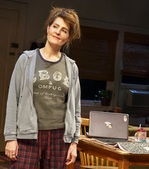 |
Sincere but why? That is how I responded to the dramatic form
given to a stream of popular inter-active on-line advice columns originally written
by Cheryl Strayed, a non-professional known to her net-work of help-seekers as “Dear
Sugar.” Some of these have been adapted from her book for the stage by
writer/actress Nia Vardalos (“My Greek Wedding”) who stands in for Strayed. As
commendably directed by Thomas Kail in this return engagement (presumably by
popular demand), the exchanges are all semi-passive, a steady stream of shared
and responsive confessionals and quires of a very personal nature.
These are the typical quandaries that people find themselves
mired in such as romance, sex, death, physical abuse and drugs, the columns had
built-in pathos with their notable displays of empathy and expressions of compassion
for the troubled souls. Listening to advice, no matter how well-intended or
sincerely spoken, does not make great theater. To be fair, the audience at the
performance I attended sat attentively while I started to squirm about midway
through the seventy-five minutes.
Vardalos plays the well-meaning guru with an engaged sincerity
(that word again.) This, as she busily inhabits the excellently designed
living-room, dining room and kitchen area of Dear Sugar’s home as well designed
by Rachel Hauck. We not only hear but see the people behind the back and forth
internet exchanges. These characters are effectively played by Teddy Canez, Hubert
Point-du Jour and Natalie Woolams-Torres. They wander in and about as required
and provide what little action the play provides. This device certainly gives
some life support to what would otherwise be simply Dear Sugar’s exchanges with
her flock/followers.
What I found most interesting is how Dear Sugar used her own
traumatic life experiences as a springboard for a personal philosophy - a mixture
of metaphysics and psychology - as a practical process for healing. This has apparently
worked for others as it had worked for herself as a working professional, wife
and mother. The actors make a concerted effort to not sound like they are reading
their epistolary-like text but it doesn’t solve the problem of this being a play
without any solidified confrontations.
Nevertheless, some very sad stories are revealed and
you would have to have a heart of stone
to not be moved to some degree. Granted that these are all interesting characters
who are yearning for love and understanding that comes back to them neatly wrapped
in wise and meaningful advice. They also remain, however, part of the heart-breaking,
complex, poignant, and tragic conditions and components that have comprised the
human experience since the beginning of civilization and that have been more affectingly
and effectively dramatized since plays were first written.
No comments:
Post a Comment